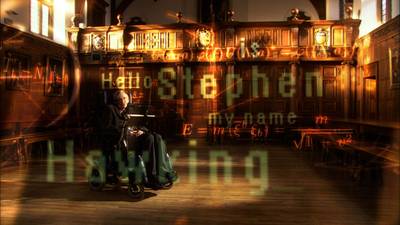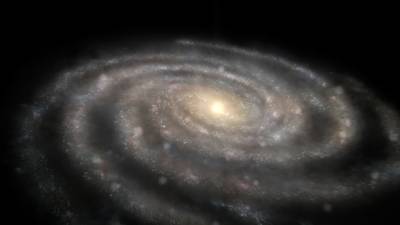
by Sara E. Pratt Thursday, January 5, 2012

Stephen Hawking illustrates the principles of gravity in 'Curiosity.' Discovery Channel

Hawking sitting in the dining hall at the University of Cambridge. Discovery Channel

Milky Way galaxy. Discovery Channel
At first, it is difficult to distinguish the Discovery Channel’s new show “Curiosity” — in which celebrity-scientists and science-oriented celebrities each host an episode purportedly answering a big question — from the many other similar shows on television, especially on Discovery itself. The premiere episode, which aired in August and was hosted by Stephen Hawking, appears to be a rehash of that old chestnut of science television, the question of how the universe began. The first clue that you are perhaps about to see something different is the disclaimer: “This program examines the creation of the universe through the commentary and opinions of Professor Stephen Hawking.” Then the question: “Did God Create the Universe?”
Hawking’s answer is a resounding “no” — the same conclusion he drew in his 2010 book, “The Grand Design,” which, as he describes it, caused quite a stir. “People got upset that a scientist would have anything to say on matters of religion,” Hawking said at the beginning of the show. “I don’t want to tell anyone what to believe, but for me, asking if God exists is a valid question for science.”
Before revealing his conclusion, Hawking leads viewers through a brief history of human understanding of the universe starting with the Vikings, who believed the wolf-god Skoll periodically ate the sun, a phenomenon now known as a solar eclipse. Hawking notes how each new scientific discovery, from Greek civilization to the scientific revolution of Galileo to the present day, removes the need for a god to explain it. “After all, if you know the science behind an eclipse, you’re much less likely to believe in wolf-gods that live in the sky,” he said. “Science does not deny religion; it just offers a simpler alternative.”
Starting the new series with Hawking and his thought-provoking conclusions — that the universe not only does not require a creator, but, in fact, does not allow for one (and by the way, there’s probably no afterlife either) — was a gutsy call by Discovery. Obviously, what’s different about this particular episode of “Curiosity” is the frank discussion by a scientist of a creator. The goal of most science television seems to be to inspire wonder and awe, which is an extremely valuable contribution to the public discourse on science. However, very few, if any, programs address the thornier issue of how hundreds of years of scientific inquiry impact long-held religious ideas about the origins of the universe.
Whether the rest of “Curiosity’s” episodes are as frank, as thought-provoking or as scientific remains to be seen. The second episode was about whether humans could survive an alien attack, so perhaps there’s our answer: It will be a mix of science and science fiction.
“Curiosity” is slated for 60 episodes over the next five years. Some of the hosts and questions already lined up are: Morgan Freeman investigating parallel universes; Robin Williams examining what drugs do to the body; Samuel L. Jackson asking how the world might end; Brendan Fraser investigating what lies beneath Egypt; Maggie Gyllenhaal asking why sex is fun; Morgan Spurlock seeing if modern humans could live as cavemen (in what sounds like an episode of “Survivor: Olduvai Gorge”); Adam Savage, of the Discovery show “Mythbusters,” testing whether we can live forever; Mike Rowe, host of the Discovery shows “Dirty Jobs” and “Deadliest Catch,” examining the microscopic organisms that inhabit the human body; and horror-movie writer and director Eli Roth questioning the nature of evil.
“Curiosity” airs on the Discovery Channel on Sunday nights at 8 p.m. EST.
© 2008-2021. All rights reserved. Any copying, redistribution or retransmission of any of the contents of this service without the expressed written permission of the American Geosciences Institute is expressly prohibited. Click here for all copyright requests.